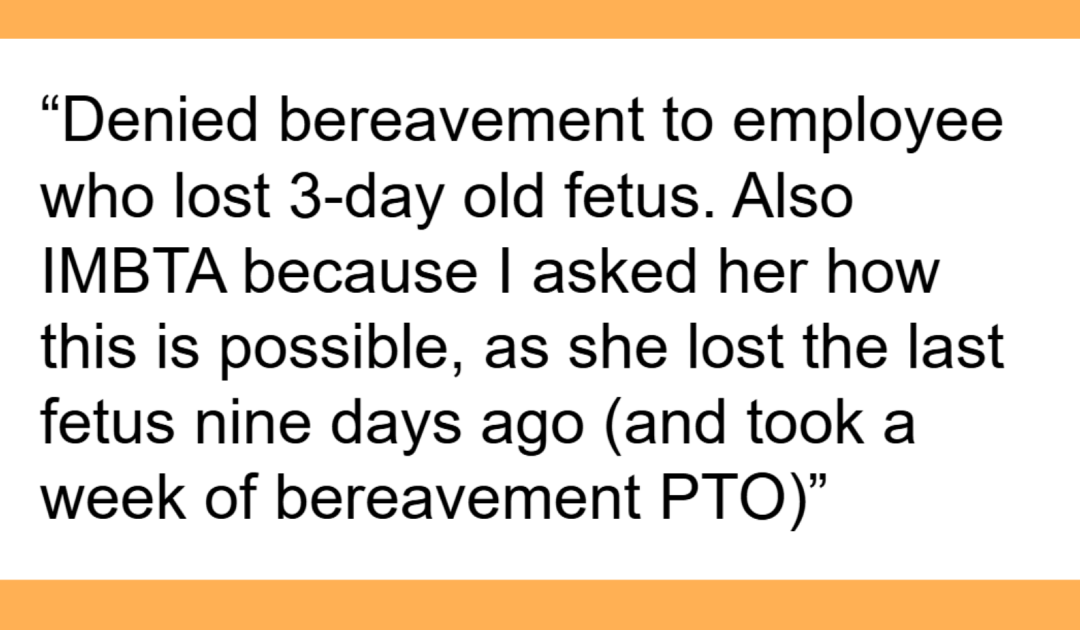A troubling story of loss, compassion, and a difficult workplace decision sparks debate online.
Bereavement leave is an essential benefit that allows individuals to process grief after the loss of a loved one. Having time away from work can provide a much-needed opportunity to begin healing and come to terms with a significant loss without the added stress of professional responsibilities.
However, in one instance, a boss felt compelled to deny bereavement leave to an employee who had just lost her 3-day-old fetus. This wasn’t the first time she had requested leave—over the course of 2024, she experienced 13 pregnancy losses and took 13 weeks of paid time off. Struggling with the situation, the boss turned to the internet to ask if he was wrong for making this decision.
The boss eventually reached a breaking point, feeling the need to enforce stricter boundaries on bereavement leave policies after granting the employee extended time off on multiple occasions.

According to the boss, the employee had already taken 13 weeks of paid bereavement leave in the previous year alone. This time off didn’t include any of her allotted vacation days or personal leave, which only added to his frustration.




The boss took to social media to ask if refusing another request for bereavement leave made him a bad person. He began his post by explaining that, after the employee’s recent loss, he asked her how it was possible for another miscarriage to occur so soon.
The employee reportedly responded by saying it wasn’t his business but then explained that she had become pregnant again the day before she returned to work. This meant the most recent pregnancy lasted only three days before ending in loss.
In his explanation, the boss shared that this employee had suffered 13 pregnancy losses in 2024, all of which lasted only a few days. She had taken 13 weeks of paid time off during that year, not counting vacation and personal leave.
Frustrated by the ongoing situation, the boss stated that he planned to update the company’s bereavement policy to require supporting medical or funeral documentation for any future leave requests. However, he ultimately decided to seek input online before finalizing these changes, wondering if he was being unfair.

Bereavement leave is a vital workplace benefit, and it’s not something employees should misuse. For those who have experienced the loss of a loved one, the ability to step away from work and grieve can be invaluable during such a difficult time.
Chris Taylor, in a piece for Reuters, highlights the importance of bereavement benefits. In the New York Life Foundation’s latest “State of Grief” report, 76% of participants said bereavement leave policies were a significant factor when considering a new job. Additionally, 85% said they would feel proud to work for an employer that actively supported grieving employees. Interestingly, 71% expressed an interest in receiving grief support training to better assist colleagues dealing with loss.
So, how can companies effectively support employees coping with grief in the workplace?

“First and foremost, employers can offer clear bereavement leave policies that would ideally include at least five paid days off,” says Rebecca Soffer, the author of “The Modern Loss Handbook.”. Beyond offering time off, employers could also provide flexibility for grieving employees by lowering work expectations and adjusting deadlines to ease their burden.
From the boss’s perspective, it seems the company has been more than accommodating in providing time off for the employee experiencing repeated losses. Perhaps it’s time to reevaluate her contract, establish clearer boundaries, and explore ways to offer maternal health support if their benefits plan allows for it.
The online community didn’t hold back in their responses, with many accusing the employee of taking advantage of the company’s kindness and generosity.


















